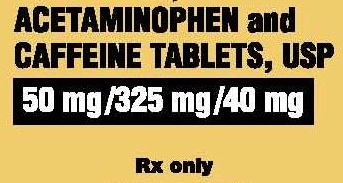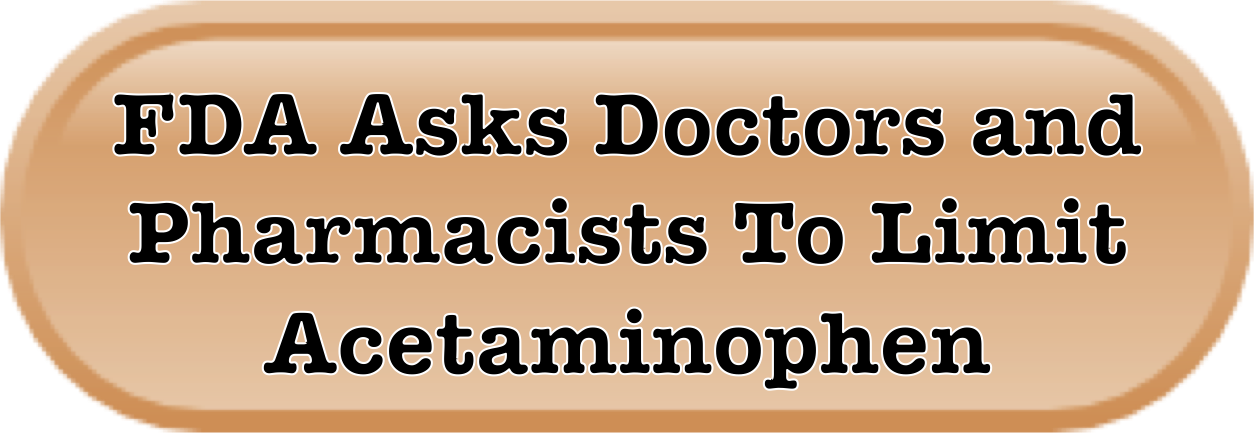In January of 2011 the Food and Drug Administration (FDA) had asked drug manufacturers to limit the amount of acetaminophen to no more than 325 mg in each tablet or capsule by January 14, 2014. While more than 50% of manufacturers complied with this request, there were many who did not. Because of this, on January 14, 2014, the FDA asked health care professionals to stop prescribing dosages of medication that exceed 325 milligrams (mg) of acetaminophen and to help prevent, in most situations, a patient from receiving more.
ACETAMINOPHEN INFORMATION
In response to the January 2011 FDA request, the FDA issued a Question and Answer report about the limitation request and the risks associated with acetaminophen. Some of the Questions and Answers include:
Question: What is acetaminophen?
Answer: Acetaminophen is a pain medication and fever reducer that is widely available and used in both prescription and over-the-counter (OTC) products. Acetaminophen is generally considered safe and effective when used as directed.
Acetaminophen in prescription products is always found in combination with other active ingredients, including opioid pain relievers. These are known as prescription acetaminophen combination products. Examples of prescription acetaminophen combination products include hydrocodone with acetaminophen (Vicodin, Lortab), and oxycodone with acetaminophen (Tylox, Percocet).
Question: Why is FDA limiting the maximum strength of acetaminophen in oral prescription products?
Answer: FDA continues to receive reports of severe liver injury associated with the use of acetaminophen-containing products. The greatest risk for severe liver injury happens when people take more than the prescribed dose of acetaminophen, take more than one acetaminophen-containing product at the same time, or drink alcohol while taking acetaminophen. Severe liver injury can lead to liver failure, liver transplant, and death.
By limiting the maximum amount of acetaminophen in oral prescription products to 325 mg per tablet, capsule, or other dosage unit, patients will be less likely to overdose on acetaminophen if they mistakenly take too many doses of acetaminophen-containing products.
Question: Will limiting the maximum amount of acetaminophen in oral prescription products alter the pain reducing effects of these drugs?
Answer: All oral prescription products containing acetaminophen also contain an additional pain medicine (usually an opioid). There are no data that indicate that taking more than 325 mg of acetaminophen per dosage unit provides more pain relief.
Under the new dosage limit, healthcare professionals can direct patients to take 1 or 2 tablets, capsules or other dosage units of a prescription product containing 325 mg of acetaminophen up to 6 times a day (12 dosage units) and still not exceed the maximum daily dose of acetaminophen (4000 mg).
Question: Are there other safety issues regarding prescription acetaminophen that FDA is communicating at this time?
Answer: FDA is also aware of rare cases of severe allergic reactions (e.g., swelling of the face, mouth, and throat, difficulty breathing, itching, or rash) that have occurred with the use of acetaminophen. FDA has asked companies to add a new Warning about the risk of allergic reactions, including anaphylaxis, to the label of all prescription acetaminophen-containing products.
Question: Is there any additional information that healthcare professionals need to tell their patients?
Answer: Healthcare professionals should advise patients to continue taking their prescription pain medicine as directed. There is no immediate danger to patients who take oral prescription acetaminophen combination products. The risk of liver injury primarily occurs when patients take multiple products containing acetaminophen at one time and exceed the current maximum dose of 4000 mg within a 24-hour period.
 Healthcare professionals should educate patients about how to properly use acetaminophen to avoid liver injury:
Healthcare professionals should educate patients about how to properly use acetaminophen to avoid liver injury:
Advise patients not to take more than the prescribed dose of an acetaminophen-containing medication.
Advise patients not to take more than one product that contains acetaminophen.
Advise patients to read all prescription and OTC labels to ensure they are not taking multiple acetaminophen-containing products accidentally.
Advise patients not to drink alcohol while taking acetaminophen-containing medications.
Healthcare professionals should also advise patients to seek medical help immediately if they have taken more acetaminophen than directed or experience swelling of the face, mouth, and throat, difficulty breathing, itching, and rash after taking acetaminophen.
FDA ANNOUNCEMENT
In the January 14, 2014, announcement, the FDA stated:
We recommend that health care providers consider prescribing combination drug products that contain 325 mg or less of acetaminophen. We also recommend that when a pharmacist receives a prescription for a combination product with more than 325 mg of acetaminophen per dosage unit that they contact the prescriber to discuss a product with a lower dose of acetaminophen.
 The FDA believes that there is no data to show that taking more than 325 mg of acetaminophen per dosage provides benefits that outweigh the added risks for liver injury. The FDA recognizes that in certain circumstances it may be appropriate to prescribe a higher dosage.
The FDA believes that there is no data to show that taking more than 325 mg of acetaminophen per dosage provides benefits that outweigh the added risks for liver injury. The FDA recognizes that in certain circumstances it may be appropriate to prescribe a higher dosage.
The FDA has found cases of severe liver injury due to acetaminophen have occurred in patients who had:
- Taken more than the prescribed dose of an acetaminophen-containing product in a 24-hour period;
- Taken more than one acetaminophen-containing product at the same time; or
- Consumed alcohol while taking acetaminophen products.
Moreover, inadvertent overdoses from acetaminophen containing prescription combination drugs account for nearly 50% of all cases of acetaminophen-related liver failure in the United States, some of which resulted in liver transplants or death.
In addition, the announcement stated that the FDA intends to:
- Institute proceedings to withdraw approval of prescription combination drug products containing more than 325 mg of acetaminophen per dosage unit that remain on the market; and
- Address OTC acetaminophen products in another regulatory action.
The FDA has a lot of information and notices about the risks associated with acetaminophen overdoses available on its website.
Sources: FDA:

